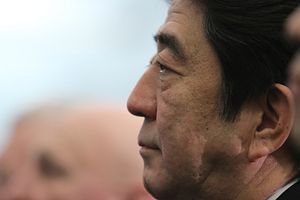As further media leaks make the probability of Prime Minister Shinzo Abe calling a snap election next week look increasingly likely, the catalyst for that election is coming into focus. The second increase of the consumption tax to 10 percent next October is proving overwhelmingly unpopular among voters; yet markets, government officials, and analysts still have a mixed opinion on the topic. As Abe now looks to refortify his political base before making such a weighty economic decision, the consensus among experts is beginning to veer toward at least a delay, if not an outright abandonment of the next tax increase.
A Reuters Corporate Survey of 250 companies concerning the sales tax found that 72 percent think the Japanese economy could not withstand the increase. This is combined with a Reuters’ poll of economists last week that found the average expectation for third quarter growth to only be 2.1 percent annually after a 7.1 percent drop the previous quarter, which is likely to be the most important figure in Abe’s decision making process. The Corporate Survey also showed that “One third of companies said they want the government to put off the tax hike by up to a year, a quarter called for a delay by a year-and-a-half or more and 10 percent want the idea scrapped.” However, news of the pending election and possible tax delay pushed Japan’s Nikkei Stock Exchange to a seven-year high on Wednesday.
Within the government there is still strong support for the tax increase, particularly from the Bank of Japan’s Governor Haruhiko Kuroda, whose surprise October 31 announcement of further monetary easing was made in expectation of the hike. The head of the Fiscal System Council, Hiroshi Yoshikawa, also agreed this week that the consumption tax should go forward as planned, saying it should be considered “from a medium- to long-term perspective.” Yet a government panel installed to consider the October increase was mixed to negative on the move. In an abrupt shift from last week when five of eight supported the plan, this week’s panel shifted to four out of nine calling to either postpone or cancel the increase, with two declining to comment and three supporting the move.
It would appear that if Abe is looking for a way out of the tax increase, the corporate sector and stock market are in favor, with popular polling showing opposition to the hike for months. It is influential bureaucrats and members of his own party that the prime minister must still contend with, as the promises of fiscal responsibility combined with Abe’s bold economic initiative have underpinned most of the government’s policy the last two years. He is likely gambling that an election will give him the power to return to this policy at a later date, yet it is unclear when the final tax increase might happen if it is indeed postponed.
































